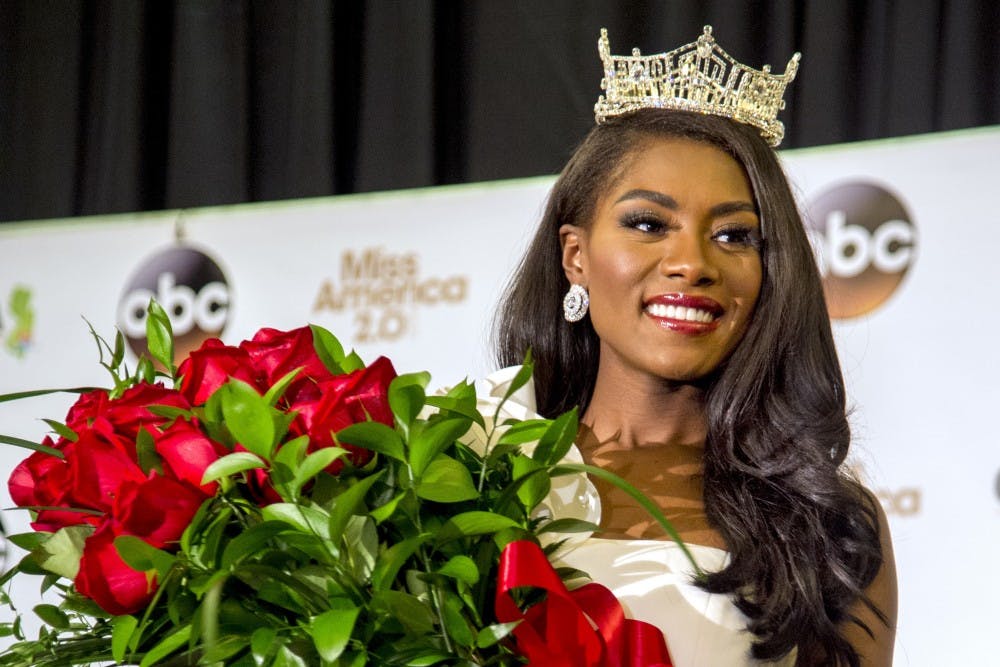By Dahleen Glanton
Chicago Tribune
As a child, I loved watching the Miss America pageant on television. In that regard, I was no different than many other young girls growing up in the 1960s.
But few probably took this fascination as far as I did. On that once-a-year Saturday evening, I'd grab a chair from the kitchen table, drag it through the house and set it directly in front of the television set.
I'd drape my shoulders in a white sheet, and across my neatly plaited hair, I'd place the rhinestone tiara I had once worn in an elementary school pageant. I'd sit there like a queen on her throne as a series of white women in beautiful gowns and perfectly coiffed hair paraded across the screen in front of me.
I don't recall ever consciously thinking about how different those young ladies were from me. Attending a segregated school in a segregated neighborhood, I'm not sure I recognized race at such a young age. And if I did, I certainly did not understand it.
All I knew is that I loved the elegance of the beauty pageant, seeing the tears flow after some lucky girl was chosen "the fairest of the fair" and watching the queen walk the runway, waving and smiling, as Bert Parks sang, "There She Is, Miss America."
At that moment, I was Miss America too.
More than a half-century later, something quite remarkable has happened in the world of pageants. In the year, 2019, African-Americans simultaneously hold the titles in all three of the biggest beauty competitions. This year, Miss America, Miss USA and Miss Teen USA are black women. All of the pageants have had several African-American winners previously, but never all three pageants at the same time.
Some will dismiss this as outdated feat at a time when women are heading major corporations, holding important political positions and are running for president. It might seem trivial at a time when women's reproductive rights are under siege and issues such as sexual violence and equal pay are finally receiving recognition.
But for this child of the South who grew up on the cusp of integration, in a small town where blacks lived on one side of the railroad tracks and whites lived on the other, a trifecta of black queens is an accomplishment worthy of attention.
While this moment has been a long time coming, it does not necessarily represent a shift in the way America defines beauty. It could, however, begin to break down societal stereotypes of black femininity that have long been perpetuated in the media.
Miss America Nia Franklin has brown skin. Miss USA Cheslie Kryst and Miss Teen USA Kaliegh Garris wear their hair in natural styles. By most standards — regardless of one's race —these women would be considered beautiful.
Still, beauty will always be in the eye of the beholder. A woman's beauty should never be her best asset, anyway. Franklin seems to understand that winning Miss America is about much more than changing America's standard of beauty.
"It is important to little brown and black girls to see three strong figures, three strong women, African-American women that are doing so much great work," said Franklin, who was crowned in September.
"People will argue that race doesn't matter. But race does matter in America, because of the history, because of slavery," she said.
Little brown and black girls are lucky that Miss America pageants are no longer just about beauty, the way they were when I was growing up. They are tough competitions that require endurance, determination, commitment and confidence. It also requires women to compete while holding challenging careers or while juggling a tough school curriculum.
Franklin is an accomplished classical singer. Kryst is a civil litigation attorney. Garris is a high school senior who plans to enter Southern Connecticut State University next year and study nursing. Even with their undeniable beauty, they are smart enough to understand that looks will never get them where they want to go in life.
Though pageants for years have generated protests from those who see them as sexist, they are, for some women, stepping stones to greater visibility. It gives them a platform from which they lobby for projects they hold dear. The pageants also provide scholarships that help pay for education.
But for black women, there always has been the extra requirement of jumping racial hurdles.
The first African-American woman to compete for Miss America was Cheryl Browne in 1970. The first to actually win was Vanessa Williams in 1983, who was crowned Miss America 62 years after the pageant began in 1921. She was also the first to be forced to resign, over nude photographs taken when she was in college.
While it is true that beauty isn't what makes a woman great, perceptions about beauty do influence how society reacts to women. That's just a sad fact. But more importantly, the way a woman feels about beauty impacts how she feels about herself.
There's nothing wrong with a little girl seeing someone who looks like her walking away with a crown.
These three women should be proud of their accomplishments. Any time someone breaks through a barrier, it makes it easier for others to follow.
I'm not encouraging little girls to set out to win a beauty pageant in order to feel good about themselves. But I am glad that little black girls can now pull their chair in front of the TV and see someone who looks like them wearing the crown.






